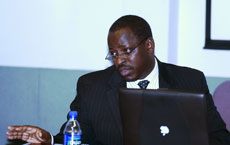Ambassador visits UI

Online Poster
Feb 9, 2005
Last updated on May 11, 2016 at 06:47 p.m.
Zac Nsenga, the Rwandan Ambassador to the United States, spoke Tuesday at the International Studies Building on matters ranging from the 1994 genocide in Rwanda to the AIDS epidemic raging throughout the nation.
“Although many people know about the genocide that took place in Rwanda in 1994, most people know little about the country’s history prior to that date or since the event,” he said.
He began with the basic facts of Rwanda and compared his country’s beauty to Switzerland’s.
Nsenga referred to Rwanda as “the land of a thousand hills, a thousand problems and a thousand solutions.”
Get The Daily Illini in your inbox!
He addressed the need for economic reforms as he cited the growing movement towards market privatization in his country.
“There are problems of reforming the economy on a global scale,” he said. “Our goal now is to focus on a few key issues, including tourism, hotels and communications – areas that can move the economy forward.”
Rwanda aims at creating a strong economy and focusing on smaller issues that can make a difference, particularly attracting tourists to the country, he said.
Nsenga discussed paying attention to small farmers by using the example of coffee growers.
“We aim to produce high quality coffee and, unlike most big name companies, we make sure that the farmers see a large percentage of the money directly back in their own hands,” he said.
Nsenga then discussed AIDS, which affects much of the country’s 8.2 million people.
“The epidemic of this disease has a negative impact on all aspects of society – social, political, economical and health issues,” he said.
Nsenga said the Rwandan government has designed a system of prevention, treatment and care to combat the disease.
“It is very difficult for people to even admit they have the disease,” he said. “Admitting that you are sick is a huge breakthrough.”
Because there is so little money to provide treatment, many Rwandans with the disease go untreated for an extended period of time.
Nsenga stated the need for “companies to produce drugs and lower prices, and make the vaccine more available to people (in Africa).”
He also emphasized the importance of education for people all across Rwanda.
“It was very poor beforehand, with many people falling off before completing their studies,” he said. “Our goal now is the development and improvement of curriculums in all levels of education.”
The government pays for the first nine years of education, so the enrollment level is very high at that level. However, he said, university enrollment in Rwanda tends to be much lower.
A select group of students study in accredited universities in other countries because they received scholarships, he said.
But, the education system has been revamped, with a new focus on science and technology.
“There has been an aggressive, deliberate process to change the education system,” he said. “Although we cannot be credited with the invention of the wheel, we are still making discoveries and achievements.”
After his slide presentation, Nsenga took questions from members of the audience.
Upon being asked about the recent release of the film Hotel Rwanda, Nsenga said that there was nothing new in the movie for him.
“Although I already knew much about what the movie had covered, I am glad that the film has encouraged many people to come and see Rwanda for themselves,” he said.
Nsenga concluded his presentation by asking University students to help rebuild Rwanda in whatever way possible.
“Only by visiting the country can you really learn about the past, present and future of Rwanda,” he said. “The most important thing is that we strive for a world of interdependence.”





